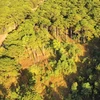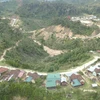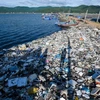The latest environmental survey of the Bac Ninh Department of Natural Resources and Environment showed that water and air in the province's craft villages was seriously polluted, said Ha Minh Hoa, director of the department's Environment Protection Division.
The Phong Khe waste paper recycling village in Bac Ninh City daily releases about 4,500-5,000cubic metres of waste water containing toxins well above regulated levels.
They include chemicals released into the water that prevents marine creatures from breathing. The amount of lead is reported to be more than five times higher than regulated levels.
Dong Ky wooden furniture village in Tu Son Town is also seriously polluted with dust, exhaust fumes, noise and high temperatures from workshops and transport vehicles.
The survey conducted early this year showed the amount of dust in the village was often nearly four times higher than regulations allow.
The 24-km Ngu Huyen Khe River is polluted by five craft villages that often discharge solid waste and waste water into it.
It was estimated that more than 60 per cent of local residents had mental and respiratory diseases, hearing problems and cancer.
Hoa blamed the lack of punishments for contributing to the problem.
"Local authorities are not competent to inspect and punish enterprises in industrial zones next to craft villages. We are only able to join hand with the zone management boards to check them," he added.
Some villages have set up environmental sanitation teams, but their work is limited by a lack of funding. Sewerage systems of most craft villages are often completely blocked.
Hoa said business owners paid little attention to investing in waste treatment systems.
"The province has set up regulations to protect the environment in craft villages, which involves strict measures for violators, such as cutting off electricity and stopping capital that has been allotted," he said.
Last year, 21 enterprises in Dong Phong Commune in Yen Phong District were cut off for violating the environment protection law.
The province also makes money available to enterprises to replace their old equipment, which releases much waste.
"But the most important thing is raising people's awareness about protecting environment," Hoa said.
"Since the beginning of this year, we have held training courses on the environment for local officials and residents to raise their knowledge," said Hoa.
Luu Duy Dan, deputy chairman of the Viet Nam Association of Craft Villages, said the association was considering shifting enterprises causing serious pollution from residential areas.
"We will set up manufacturing areas depending on the specific characteristics of craft villages recycling steel and paper - and making wooden furniture," said Dan.
This work will help separate and treat waste easier, he added.
Bac Ninh Province , 20-km to the north of Hanoi has 62 craft villages, of which 30 are traditional handicraft villages./.
The Phong Khe waste paper recycling village in Bac Ninh City daily releases about 4,500-5,000cubic metres of waste water containing toxins well above regulated levels.
They include chemicals released into the water that prevents marine creatures from breathing. The amount of lead is reported to be more than five times higher than regulated levels.
Dong Ky wooden furniture village in Tu Son Town is also seriously polluted with dust, exhaust fumes, noise and high temperatures from workshops and transport vehicles.
The survey conducted early this year showed the amount of dust in the village was often nearly four times higher than regulations allow.
The 24-km Ngu Huyen Khe River is polluted by five craft villages that often discharge solid waste and waste water into it.
It was estimated that more than 60 per cent of local residents had mental and respiratory diseases, hearing problems and cancer.
Hoa blamed the lack of punishments for contributing to the problem.
"Local authorities are not competent to inspect and punish enterprises in industrial zones next to craft villages. We are only able to join hand with the zone management boards to check them," he added.
Some villages have set up environmental sanitation teams, but their work is limited by a lack of funding. Sewerage systems of most craft villages are often completely blocked.
Hoa said business owners paid little attention to investing in waste treatment systems.
"The province has set up regulations to protect the environment in craft villages, which involves strict measures for violators, such as cutting off electricity and stopping capital that has been allotted," he said.
Last year, 21 enterprises in Dong Phong Commune in Yen Phong District were cut off for violating the environment protection law.
The province also makes money available to enterprises to replace their old equipment, which releases much waste.
"But the most important thing is raising people's awareness about protecting environment," Hoa said.
"Since the beginning of this year, we have held training courses on the environment for local officials and residents to raise their knowledge," said Hoa.
Luu Duy Dan, deputy chairman of the Viet Nam Association of Craft Villages, said the association was considering shifting enterprises causing serious pollution from residential areas.
"We will set up manufacturing areas depending on the specific characteristics of craft villages recycling steel and paper - and making wooden furniture," said Dan.
This work will help separate and treat waste easier, he added.
Bac Ninh Province , 20-km to the north of Hanoi has 62 craft villages, of which 30 are traditional handicraft villages./.



















